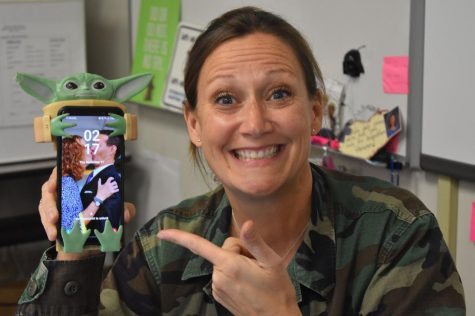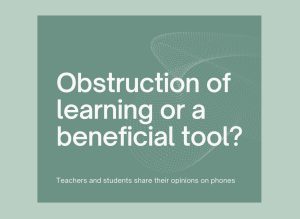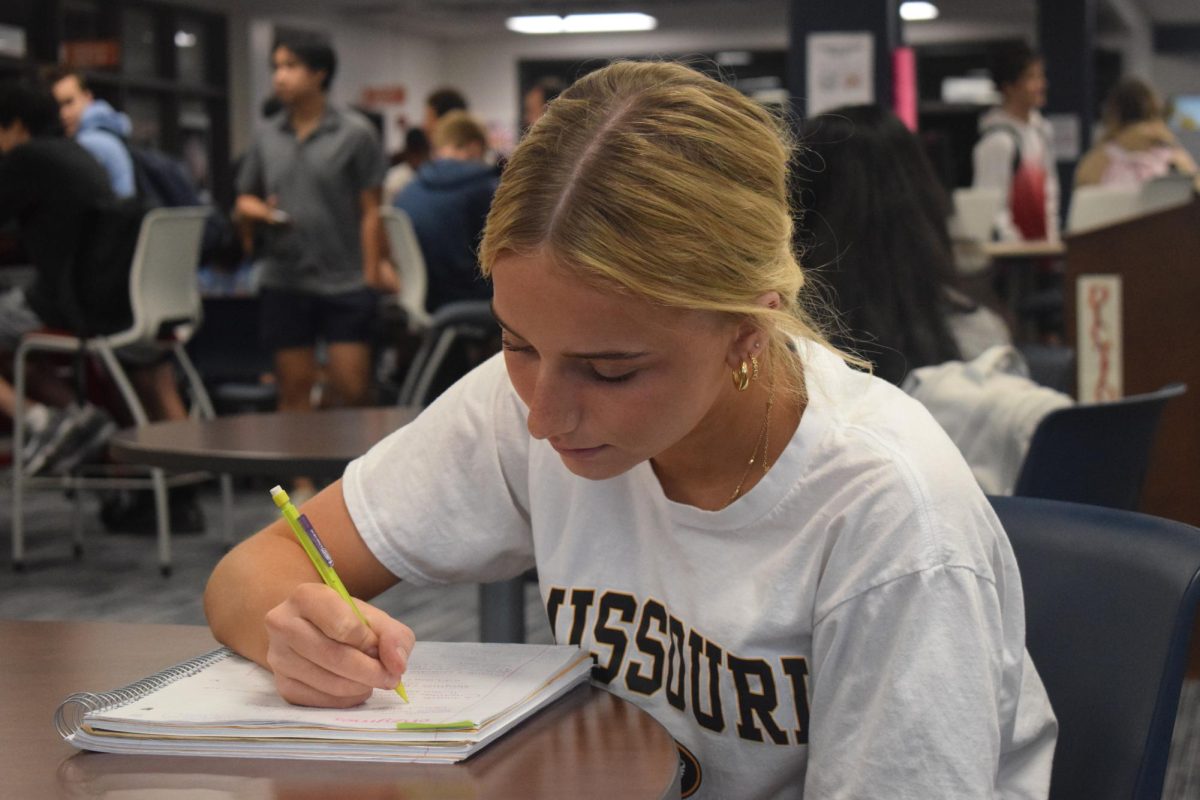Teachers are fed up and searching for solutions
January 14, 2022
According to the Addiction Center, phone addiction is as serious of a problem as any other addiction. This behavior has been named “nomophobia,” or the fear of being without a device. Because phones are specifically designed to be a reliance in our lives, adults and students alike are becoming addicted unbeknownst to them.
The Addiction Center has established that the overuse of phones is a serious problem not only in our school but the world as a whole. English teacher Casey Holland says he goes through daily challenges when his students are distracted during his teaching.
“Before the pandemic, I would have students come in and they were assigned a slot [for their phone] and they would drop them in [at the beginning of class]. Then coming back from the pandemic, I thought, ‘I’m not going to be a babysitter.’ It’s a privilege to be at school and I thought that everybody would feel the same way,” Holland said. “But the disrespect and just the overuse is way too much. I told [my students] I will get that back out and we’ll do that, but I don’t want to because it’s a waste of instructional time.”
According to English Academic Support Center teacher Kristen Witt, students are experiencing difficulties paying attention due to the unprecedented times they are experiencing.
“[Phone addiction] is a serious problem. It’s a bigger problem this year than in any years past because for the last two years while we were online, we went unattended [on our phones] for too long. Now we are obsessed with our phones and we are not able to put them down, step away from them or do anything that is not on our phones. It is very hard to do work when you have to fight the phone,” Witt said.
While all teachers who were interviewed mentioned that student phone usage should be considered an addiction, Choir teacher Brian Parrish went as far as to compare the phone addiction to gambling.
“Well, if I spent a year and a half gambling all the time, I might be more addicted to gambling today than I was back then. Same thing with drugs. I think if you recognize the reality of [the phone addiction], you know. If you watch the “Social Dilemma” documentary, [they talk about how] when you have teams of 50 engineers whose only job is to make a game more and more addicting to young people, that’s their primary direction. You can’t blame the kid. Do you blame the 50 engineers who did their job?” Parrish said.
Teachers have different ways of dealing with students on their phones in their classrooms. Science teacher Colleen O’Toole has decided that, at least for now, she is not using a pocket organizer or taking her students’ phones daily. While she thinks this route makes it much harder for the teacher, it is worth it in the end for the students.
“I used to [take students’ phones] for my classes, but then I struggled with that one because where do we draw the line on personal responsibility? We live in a world with cell phones and that is just kind of how it is now,” O’Toole said. “When we take them, are we really teaching them how to manage that distraction with the priorities that they need to get accomplished in school? That one is really a back and forth for me. Would it make my life easier to take them away from them and would they pay attention? Yes, but I can’t be the phone police. I don’t know. I really struggle with it.”

Witt has thought of a unique way to ask her students to put her phone away. She says that she has tried the pocket organizers in the past, but like O’Toole, she decided that this does not help the student.
“I hope that [students] can manage their phones on their own and if not, then I have some other ways that we can hold the phone so that we can get our work done,” Witt said. “So usually, I will offer to hold it for them. Or in extreme situations, Baby Yoda can hold them or they get an individualized phone holder. So what that means is that the phone holder would just hold your phone for you so you don’t have to worry about it and you can get your work done, but the student still decides if they want to or not in most cases.”
Witt and Spanish teacher Dominique Navarro have similar strategies, in that they give students the option to have their phones taken away at the beginning of class. Navarro discussed that phones are an even bigger problem in a language class because of the easy access to translation tools that can be used to cheat on assignments and tests.
“I have just heard from other teachers who don’t [have a phone pocket organizer] that if you don’t set a rule from the beginning of the school year, it’s harder to reinstate later. So it’d be really hard for me had I not done this from the beginning of the school year,” Navarro said. “If all of a sudden, I told all my students [in the middle of the school year] ‘Okay, now you’re gonna start putting your phones away,’ it’s gonna cause some kind of revolution. If I just say from the beginning, ‘This is my classroom. Those are my rules,’ then [the students] would technically follow them. I see other colleagues who don’t have it in their rooms, and it’s causing a lot of issues.”
Navarro has children of her own who are sophomores and freshmen and sees an uptick in their screen time as well. Students and teachers alike are working together to find solutions to this problem.
“I come home and I ask my own kids [what their screen time is], because I started realizing that we have an average screen time of five to six hours. When they come home at three and they’ve already had three hours of screen time. How is that? How is it even possible? To be on your phone for three hours when you finish school, and school is only seven hours long in the first place,” Navarro said.


![Mid-air, junior Donovan Qualls leaps for the soccer ball during the varsity game against Ladue on Oct. 21. As the goalie, Qualls focused on keeping the ball away from the box and the back of the net. “[Being a goalie] is pretty tough. You have to be the commander of the team in your box, step up for your team, be loud, and have a lot of communication. Once you do it for a while, it gets fun. I really enjoy being the backbone of my team,” Qualls said.](https://pwestpathfinder.com/wp-content/uploads/2025/10/DSC7136-Enhanced-NR-1200x798.jpg)

